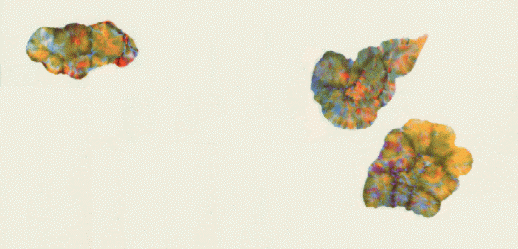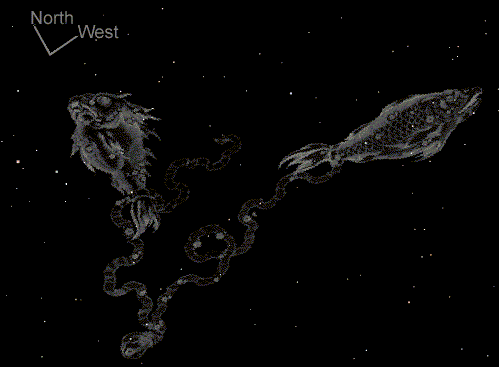ISLANDS
- side two -
- chapter index -
pg. 1 - Ladies of the Road | pg. 2 - A Flower Lady's Daughter | pg. 3 - Taming the Ox
pg. 4 - Prelude : Song of the Gulls | pg. 5 - Returning Home | pg. 6 - Islands
pg. 7 - Earth, Stream and Tree | pg. 8 - Beneath the Wind Turned Wave | pg. 9 - Dark Harbor Quays
pg. 10 - The Ego and the Self | pg. 11 - Magnum Opus
page index
The Hero's Journey | Pisces
site index
Translate from
"Beneath the wind turned wave
Infinite peace
Islands join hands
'Neathe heaven's sea."
"Carl Jung described the collective unconscious with two metaphors. One is as a chain of islands which appear to be separate above the surface of the ocean but are really connected below sea level."
- Islands
by Sandra K. Webster

"In the Hindu view, our individual egos are like islands in a sea: We look out at the world and each other and think we are separate entities. What we don't see is that we are connected to each other by means of the ocean floor beneath the waters.
- Introduction to C.G.Jung
by George Boeree, Phd
"We can depict the layers of the Collective Unconscious as rock strata in the earth, as Jolande Jacobi has done in her book on Jung's Psychology, with persons being little hills rising above the plain of the collective. If we cover the plain with water, the persons become islands which are apparently separate, but in reality are connected below by common strata of rock (the collective). The water level is the boundary between conscious and unconscious. Everything below water is "unconscious," some of it personal, some of it collective. We all seem to be little islands, separate and distinct, wandering around and talking to each other across the waves, arguing about war and property rights and high taxes. Yet we are connected below, and at some level (in the basic clay of life) we are all One, for good or ill."
- Occult Psychology
by Alta J. LaDage
In Man and His Symbols, Jung shows us the same archetypes in the untutored dreams of contemporary children, in medieval alchemy, in Hindu mythology, and in Persian folk tales. Joseph Campbell and Alan Watts have continued and extended this study of a vast and strange inner world, little appreciated until quite recently. How does Jung account for the universality of symbolic themes? He sees it as evidence for the collective unconscious, which I have called "the waters of life," or "the ocean," a realm of consciousness which could be called the collective Soul of humanity. Where is this collective Soul? Everywhere. Nowhere. Soul and divinity are not in nature, and thus have no size or position. Nature is in Soul, rather than vice versa. This is the Unitary Worldview.
- The Science of Metaphysics
by Thales of Miletus
"Jung... also postulated the concept of the collective unconscious. In it are the archetypes, tendencies to form universal images--archetypal images; these can be images of animals, people, anthropomorphic beings (such as the vampire or gods and goddesses), objects (a tree, a house, a cross or a mandala, for example), abstract ideas (made concrete by the images), and patterns such as the hero's journey, as in Joseph Campbell's Hero With a Thousand Faces."
- Jungian Outline
In other words, the story told on the album (the hero's journey) is itself an archetype.
return to page index
site index
Campbell on the Hero's Journey
1. Separation "The hero ventures
forth from the world of common day..."
Formentera Lady
into a region of supernatural
wonder. . .'
The hero sets forth, or 'is lured,
carried away...,"
Sailor's Tale
"...or else voluntarily
proceeds to the threshold of
adventure.
2. Initiation "fabulous forces are
there encountered and a decisive
victory is won . . .'. At the
"threshold of adventure," the hero
may meet a guardian whom he
'may defeat or conciliate'; then he
may go "alive into the kingdom of
the dark (brother-battle,
dragon-battle; offering, charm),
[Odysseus' moly] or be slain by an
opponent and descend in death
(dismemberment, crucifixion)..."
The Letters
"...[Dionysus]. The hero meets
'familiar yet strangely intimate'
powers who test him / her...,"
Ladies of the Road
"...or give
'magical aid (helpers).' After a
'supreme ordeal,' the hero gains a
reward: union with earth goddess
(sacred marriage), recognition by a
father-creator, divine status, or the
theft of some boon (bride theft,
fire-theft).
3. Return
Prelude: Song of the Gulls
"...the hero comes back
from this mysterious adventure with
the power to bestow boons [gifts] on his
fellow man'. The hero returns either
with protection, or "he flees and is
pursued." The hero comes back
'from the kingdom of dread (return,
resurrection),' sometimes bringing
a boon..."
Islands
"...that "restores the world
(elixir)."
- The Hero's Three-Part Journey
return to page index
site index
"..................There are several signs
in eyes that see all the way to the ocean. Bewilderment
is one. Those who study foam and flotsam near the edge
have purposes, and they'll explain them at length!
Those who look out to sea become the sea,
and they can't speak about that. On the beach
there's desire-singing and rage-ranting,
the elaborate language-dance of personality,
but in the waves and underneath there's no volition,
no hypocrisy, just love forming and unfolding."
- Say I Am You
Rumi
"In astrology, Pisces is a water sign and ruled by Neptune. Pisces is considered to be the most mystically inclined of all the signs and, as the last of the twelve, it represents the return to the great ocean from which life first evolved, and where all boundaries are dissolved. Often dreamy and diffuse, they are seen as also being gentle, creative, intuitive and sensitive.
The constellation of Pisces falls immediately before the vernal equinox. In terms of the psyche it symbolizes that inner, shadowy world in which we talk either with God or the Devil. In horoscopic terms this translates as a highly impressionable and receptive nature..."
- Pisces
"Pisces brings together all that is learned by the first eleven Signs to help man reach the pinnacle of his potential. Pisceans are selfless and spiritual, often strongly intuitive, and they are receptive to the collective unconscious."
- Pisces
Pisces Motto: I Believe.
 "Planet: Neptune. Pisces is the home of Jupiter (Zeus, king of the gods) and his
brother Neptune (Poseidon, king of the sea). Jupiter provides a thirst for
knowledge and
understanding, with a natural lucky streak. Neptune bestows sensitive and
spiritual qualities, but it also opens interest in deception and intrigue.
"Planet: Neptune. Pisces is the home of Jupiter (Zeus, king of the gods) and his
brother Neptune (Poseidon, king of the sea). Jupiter provides a thirst for
knowledge and
understanding, with a natural lucky streak. Neptune bestows sensitive and
spiritual qualities, but it also opens interest in deception and intrigue.
Neptune is about everything that isn't quite real: illusion and disillusionment, fantasy, drama and art, and spirituality. All of these things are important to people born under Pisces; they tend to be strongly spiritual (not necessarily religious) and artistic. They are idealistic, but sometimes their dreams are vague and impractical.
Symbol: Two Fishes. They reflect the dual nature of life; each fish swims in different directions, representing reality and nonreality, consciousness and the unconscious."
- Shiokaze
|
|
chapter & page index |
|
Sign
the Dreambook
![]() Read
the Dreambook
Read
the Dreambook

|

|

|

|

|

|

|

|

|

|

|

|

|

|

|

|
 |
 |
 |
 |
 |
|
| Works |
Lyrics
& Poems |
Gallery |
Guestbook
Archive |
Links | Discography |
E-mail:
Peter Sinfield Jon Green |
Page One |

Return to the Song Soup On Sea Homepage
These Pages Created and Maintained using
 Arachnophilia
Arachnophilia
Copyright © 1998 - 2001 ~ Jon Green /All rights reserved